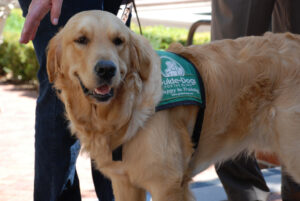 It’s National Guide Dog Month, which means it’s a great time to learn about or refresh yourself on some of the basics of guide dog etiquette. Guide dogs, or service dogs, are trained to perform tasks that specifically aid owners with a variety of disabilities. (Dogs that are not trained to perform tasks, but that provide comfort, are called emotional support animals and are not protected in the same way.) This can range from hearing or vision loss, PTSD, OCD, and many others.
It’s National Guide Dog Month, which means it’s a great time to learn about or refresh yourself on some of the basics of guide dog etiquette. Guide dogs, or service dogs, are trained to perform tasks that specifically aid owners with a variety of disabilities. (Dogs that are not trained to perform tasks, but that provide comfort, are called emotional support animals and are not protected in the same way.) This can range from hearing or vision loss, PTSD, OCD, and many others.
- Guide dogs are allowed anywhere people are allowed. This right is safeguarded by the Americans with Disabilities Act.
- Guide dogs are working animals. Give them space to do their jobs!
- Don’t pet or attempt to play with a guide dogs without asking the owner first.
- This also means you should ask before allowing your own dog to interact with a guide dog. Though guide dogs are selected for their good tempers, they may become stressed by interacting with another animal.
- For anyone acting in an official capacity in Massachusetts: If you are not certain that an animal is a service animal, you are allowed to ask if it is a service animal required because of a disability or what tasks the animal performs. Further questions infringe upon a person’s privacy rights.
Though therapy or emotional support dogs are not protected in the same way, they also perform valuable services by offering comfort and stress reduction. MIT Libraries hosts Furry First Fridays throughout the academic year in the Hayden Library foyer. Dogs are certified by Dog B.O.N.E.S. and would love to help you relax. And check back during exam time for Cookies with Canines, when MIT Libraries offer snacks along with quality time with some happy pups.

